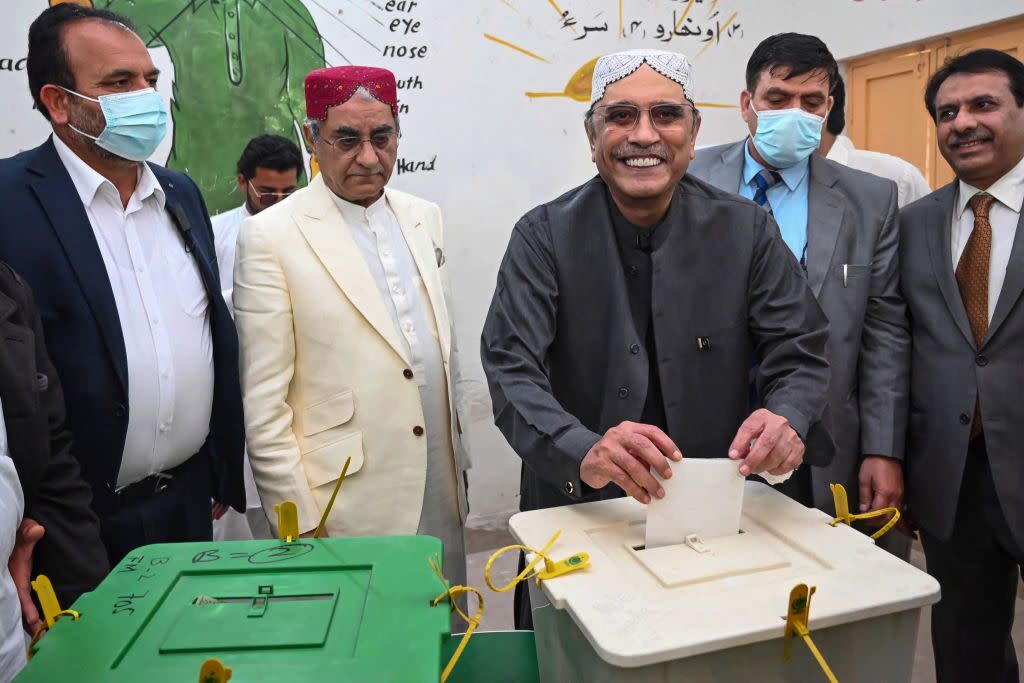Zardari Returns as Pakistan’s President After Deal With Sharif

(Bloomberg) -- Pakistan’s lawmakers elected Asif Ali Zardari as president for a second time, the result of a deal struck between the veteran politician and allies of Prime Minister Shehbaz Sharif.
Most Read from Bloomberg
One of the Most Infamous Trades on Wall Street Is Roaring Back
Stocks Kick Off Key Inflation Week Under Pressure: Markets Wrap
‘Oppenheimer’ Wins Seven Oscars Including Best Picture, Director
Zardari secured 411 votes, beating a candidate put forward by jailed former leader Imran Khan who only received 181 votes, the Election Commission said in a statement.
Senators and members of the national and provincial assemblies traditionally come together to vote for a president every five years. The presidency is largely ceremonial due to Zardari’s move in 2009 to strip it of most of its formal powers when he last assumed the role, though he still wielded significant power behind the scenes.
It’s a scenario that is likely to be repeated, analysts said.
Zardari co-chairs the Pakistan Peoples Party, the third largest group in the National Assembly after February elections. The PPP agreed to back Sharif as prime minister but stopped short of joining his cabinet, stirring concerns the new government will be vulnerable to getting toppled.
Any further political turmoil could complicate Sharif’s plans to seek at least $6 billion in new loans from the International Monetary Fund and carry out the reforms that the multilateral lender is seeking in exchange for releasing the funds. The PPP has been against the privatization of state-run enterprises — a key part of the IMF reform push.
Read more: Pakistan PM Looks to Speed Up IMF Talks With Deal Expiring
The PPP and Zardari are “now part of the power structure and in a way, Sharif’s government will be beholden to them,” said Zahid Hussain, a political commentator and author of Hybrid Rule in Pakistan.
Ahead of the vote at a campaign dinner for his presidency, Zardari, 68, said he wanted to work with Sharif to steer the country out of the economic crisis.
“Einstein was not afraid of difficult challenges and Shehbaz Sharif will not be afraid either,” he said.
Political Operator
The son of a cinema business owner, Zardari rose to prominence when he wed Benazir Bhutto in 1987 in an arranged marriage. A year later, she became prime minister and he joined her cabinet, earning the nickname “Mr. 10%” on allegations of corruption and kickbacks — which he has repeatedly denied.
Zardari has spent time in and out of jail — a common rite of passage for most Pakistani politicians who say it is usually orchestrated by their opponents. He entered the international spotlight after his wife was assassinated by militants, becoming president for the first time on a wave of public sympathy.
Along the way, he has earned a reputation of being a deft political operator, positioning himself as a kingmaker in alliances and negotiating with the military, which has ruled over Pakistan directly or indirectly for most of its history.
Zardari led political leaders in parliament including Sharif’s elder brother and three-time premier Nawaz in 2008 to force military dictator and then-President Pervez Musharraf to resign or face impeachment. Zardari’s coalition then became the first government to complete a full five-year term in Pakistan’s history despite later falling out with the Sharif brothers.
Shaista Tabassum, a professor of international relations at the University of Karachi, said that when Zardari is president, he may be used as “a tool for the military establishment to control the Sharifs.”
Zardari takes over from Arif Alvi, who was a close ally of former premier Khan. Alvi resisted the ex-cricket star’s ouster in a no-confidence vote in April 2022 and created various constitutional and legal hurdles for Sharif’s government when it took over.
For now, it will be smooth sailing, analysts said.
“There will be a more cooperative relationship, until and unless there are serious issues,” said Umbareen Javed, a professor at the Lahore School of Economics. “Zardari knows how to play his cards.”
Most Read from Bloomberg Businessweek
Academics Question ESG Studies That Helped Fuel Investing Boom
How Apple Sank About $1 Billion a Year Into a Car It Never Built
Luxury Postnatal Retreats Draw Affluent Parents Around the US
The Battle to Unseat the Aeron, the World’s Most Coveted Office Chair
How Microsoft’s Bing Helps Maintain Beijing’s Great Firewall
©2024 Bloomberg L.P.



